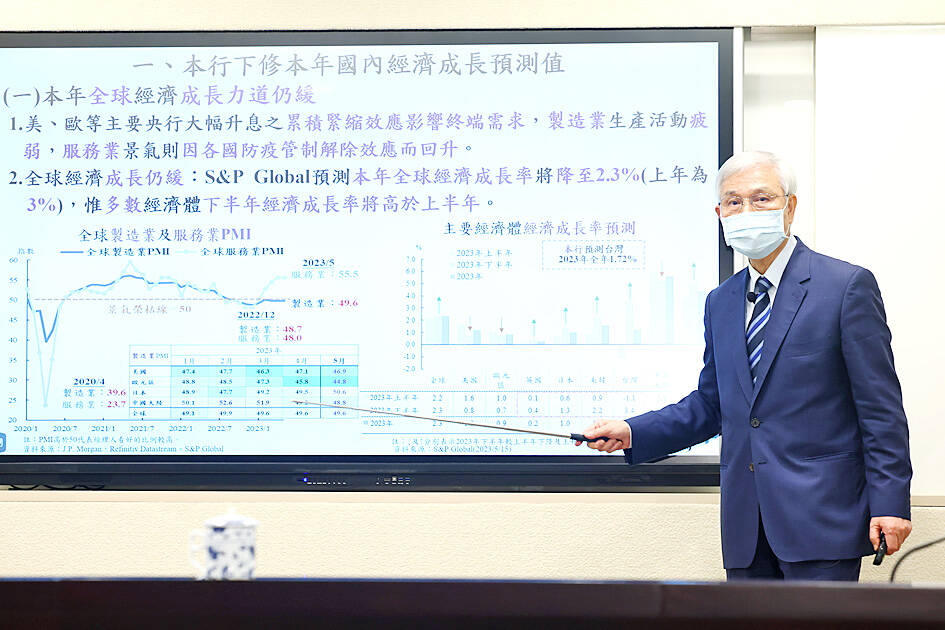The central bank yesterday kept its policy rates unchanged as it took cues from the US Federal Reserve’s announcement overnight, and tightened lending terms for second-home mortgages in some municipalities.
Taiwan’s central bank cut its GDP growth forecast for this year from 2.21 percent to 1.72 percent and raised its consumer price index (CPI) projection from 2.09 percent to 2.24 percent.
“Fighting inflation remains our top priority, but we think it is time to pause and see how previous rate hikes will affect inflation and the economy,” central bank Governor Yang Chin-long (楊金龍) told a news conference after the bank’s quarterly board meeting.

Photo: CNA
The discount rate would stay unchanged at 1.875 percent, the collateralized refinancing rate would stay at 2.25 percent and the unsecured lending would remain 4.125 percent, the bank added.
Yang said he cannot rule out resuming interest rate hikes if inflationary readings veer from the bank’s 2 percent target.
Entertainment and rent costs, as well as wage increases, have boosted the CPI and hindered efforts to reduce inflation, Yang said, adding that inflation driven by the service sector would persist until supply and demand reach an equilibrium.
That explains why central banks worldwide are more willing to live with high inflation and wait to achieve their 2 percent targets next year or in 2025, he said.
Economic weakness at home and abroad warrants the tempered approach, he added.
The central bank is more conservative than the Directorate-General of Budget, Accounting and Statistics (DGBAS) about Taiwan’s export and private investment outlook, and less upbeat about private consumption.
The statistics agency last month forecast GDP growth of 2.04 percent for this year.
The Fed said that a rate pause would give it more time to observe the cumulative and lagging effects of earlier interest rate hikes.
Taiwan’s central bank has raised rates by 75 basis points since March last year to curb inflation.
Last month, the CPI rose 2.02 percent from a year earlier, the slowest rise since July 2021, DGBAS data showed.
The central bank yesterday also lowered the loan-to-value (LTV) ratio for second-home mortgages from 75 percent to 70 percent in Taipei, New Taipei City, Taoyuan, Taichung, Tainan and Kaohsiung, as well as Hsinchu City and County.
The move came after house loans climbed to 37 percent of overall lending in April, from 36.83 percent in December last year, while the LTV ratios increased from 75.5 percent to 77 percent, warranting further selective credit controls, Yang said.
Hopefully, the move would help prevent capital from flowing to the real-estate sector, he said.

Taiwan is gearing up to celebrate the New Year at events across the country, headlined by the annual countdown and Taipei 101 fireworks display at midnight. Many of the events are to be livesteamed online. See below for lineups and links: Taipei Taipei’s New Year’s Party 2026 is to begin at 7pm and run until 1am, with the theme “Sailing to the Future.” South Korean girl group KARA is headlining the concert at Taipei City Hall Plaza, with additional performances by Amber An (安心亞), Nick Chou (周湯豪), hip-hop trio Nine One One (玖壹壹), Bii (畢書盡), girl group Genblue (幻藍小熊) and more. The festivities are to

Auckland rang in 2026 with a downtown fireworks display launched from New Zealand’s tallest structure, Sky Tower, making it the first major city to greet the new year at a celebration dampened by rain, while crowds in Taipei braved the elements to watch Taipei 101’s display. South Pacific countries are the first to bid farewell to 2025. Clocks struck midnight in Auckland, with a population of 1.7 million, 18 hours before the famous ball was to drop in New York’s Times Square. The five-minute display involved 3,500 fireworks launched from the 240m Sky Tower. Smaller community events were canceled across New Zealand’s

‘SLICING METHOD’: In the event of a blockade, the China Coast Guard would intercept Taiwanese ships while its navy would seek to deter foreign intervention China’s military drills around Taiwan this week signaled potential strategies to cut the nation off from energy supplies and foreign military assistance, a US think tank report said. The Chinese People’s Liberation Army (PLA) conducted what it called “Justice Mission 2025” exercises from Monday to Tuesday in five maritime zones and airspace around Taiwan, calling them a warning to “Taiwanese independence” forces. In a report released on Wednesday, the Institute for the Study of War said the exercises effectively simulated blocking shipping routes to major port cities, including Kaohsiung, Keelung and Hualien. Taiwan would be highly vulnerable under such a blockade, because it

The Ministry of Foreign Affairs (MOFA) yesterday said it is closely monitoring developments in Venezuela, and would continue to cooperate with democratic allies and work together for regional and global security, stability, and prosperity. The remarks came after the US on Saturday launched a series of airstrikes in Venezuela and kidnapped Venezuelan President Nicolas Maduro, who was later flown to New York along with his wife. The pair face US charges related to drug trafficking and alleged cooperation with gangs designated as terrorist organizations. Maduro has denied the allegations. The ministry said that it is closely monitoring the political and economic situation